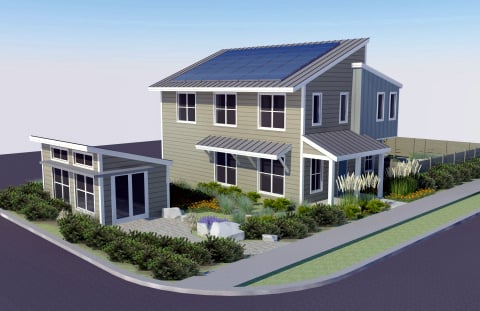Students at University of California-Davis (UC-Davis) are getting “smarter” all the time—and not just academically. In 2011, the school cut the ribbon on West Village, a new neighborhood adjacent to the campus that is now the largest planned net-zero energy community in the United States. And now, Torrance, California-based American Honda (News - Alert) Motor Co. has announced that it will create the Honda Smart Home US, a showcase for environmental innovation and renewable energy enabling technologies, within the village.
A groundbreaking day at the construction site on the campus - today will mark the start of the building process, which will be documented and shared through the Honda Smart Home US website. The home will demonstrate the automaker’s vision for sustainable, net-zero living and personal mobility—including the use of solar power to charge a Honda Fit EV battery electric vehicle.
UC-Davis West Village
Since officially opening in October 2011, UC-Davis West Village continues to grow as a community and energy research hub at which students, staff and faculty live and learn. Homes for faculty and staff are priced at below-market values. Student residences are competitively priced, as compared to other rental options in the city of Davis or on campus, based on location and amenities.
The $280 million project has been made possible by aninnovative public-private partnership; it is supported with nearly $7.5 million in federal and state grants to study zero net energy systems.
Energy efficiency measures havereduced projected energy demand by approximately 50 percent as compared to current building code requirements. Renewable energy will meet the remaining energy needs on an annual basis. The project draws on the expertise of UC-Davis faculty and research centers. New technologies being explored include solar generation; as well as the use of a biodigester, developed by a UC-Davis professor, to make energy from campus waste.
For residents, down-to earth design meets advanced technology with web and smartphone applications for monitoring energy use and saving electricity.

Honda’s Smart Home US
The Honda Smart Home US–designed to use less than half of the energy of a similarly sized new home in the Davis area for heating, cooling, and lighting—also will give its occupants comprehensive control over all home systems, allowing the residents to remotely and continually monitor and adjust all aspects of energy use in real time.
Many advanced technologies are being used at the residence—among them:
· A solar power system: A photovoltaic (PV) solar system will provide the energy for the home and for daily commuting in an all-electric vehicle like the Honda Fit EV. The zero net energy home will generate, on average, more electricity from on-site renewable power sources than it will receive from its electric utility provider.
· A Honda Energy Management System: The Honda Energy Management Systemintroduces a smart-grid technology that will actively manage energy use and communicate with the homeowner and utility provider, enabling the home to maximize its energy efficiency while responding to the needs of the electrical grid, thereby minimizing the impacts of solar generation and electric vehicle charging on the utility grid.
· High-efficiency HVAC (heating, ventilation and air conditioning) and lighting designed by UC Davis: UC Davis energy research centers will design high-efficiency, cost effective solutions to major home energy loads. UC Davis researchers will explore new methods for geothermal heating and cooling, and a new circadian color control logic LED lighting system to improve quality of life while reducing energy consumption.
· Direct solar-to-vehicle charging: Direct PV-to-vehicle DC battery charging will substantially improve charging efficiency by reducing losses associated with DC-to-AC and AC-to-DC conversion. "PV-to-EV" charging will decrease CO2 emitted in the lifecycle of an electric vehicle by avoiding the carbon associated with grid electricity production.
· A certified "green" home: The home will be designed to achieve top-level green building certifications from the major U.S. rating systems. With a holistic approach to sustainability, the home will feature passive design elements as well as novel materials to further reduce CO2 emissions from the production of building materials and the construction and operation of the home.
Honda anticipates construction of the Honda Smart Home, at a site in the UC-Davis West Village development, to be completed by the end of 2013. The home will be leased to individuals associated with UC Davis, though further details have not been finalized.
In 2012, Honda unveiled the Honda Smart Home System (HSHS) in the city of Saitama, Japan. The HSHS project includes two homes: One is a demonstration-only home, while the other serves as a residence for Honda associates. Both feature comprehensive controls of in-house energy supply and demand, and help manage both the generation and consumption of energy for the home.
"With Honda Smart Home US we will showcase our vision for a lifestyle that produces zero CO2 and that could even save consumers money," said Steve Center, vice president of the Environmental Business Development Office of American Honda Motor Co., Inc. "Home energy use and personal mobility account for most of an individual's carbon emissions. By addressing both sources together, we are advancing technologies that will reduce carbon and eventually transform home design."
"As an academic leader in sustainability research, UC-Davis is proud to be the site of this innovative research home, which will take us to the next level of energy research and deployment," said Energy Efficiency Center director Nicole Woolsey Biggart. "We are excited by the opportunity for our scientists to test new ideas for integrated and commercially viable carbon-reduction technologies."
Edited by
Stefania Viscusi